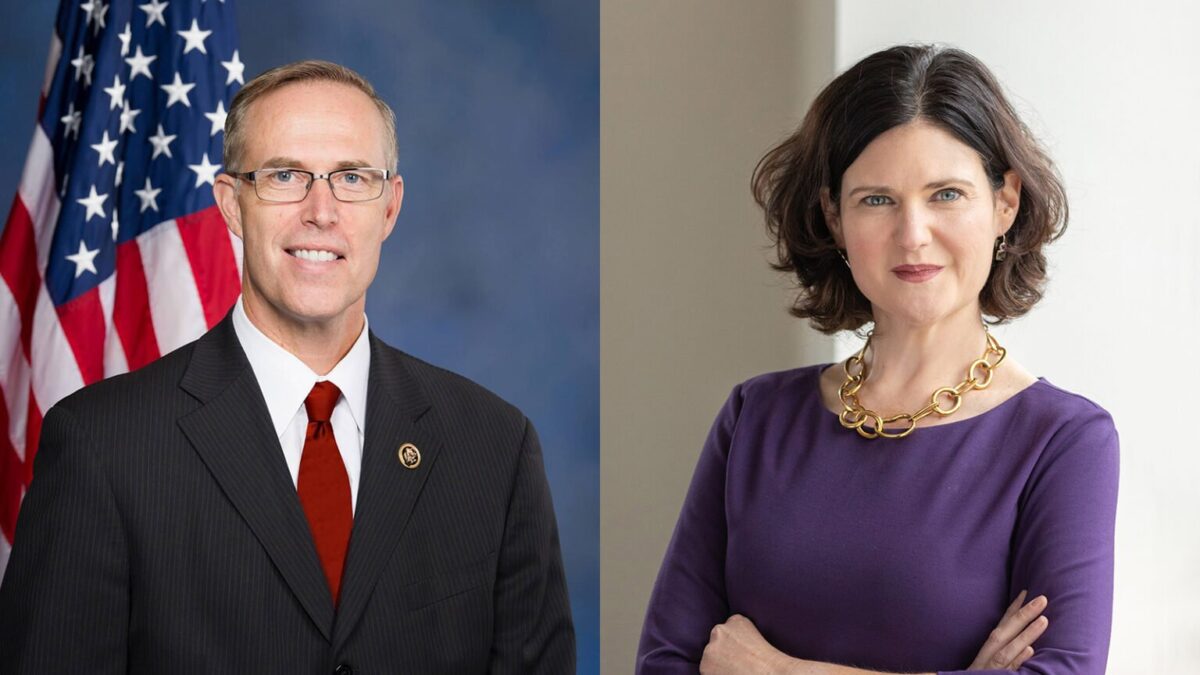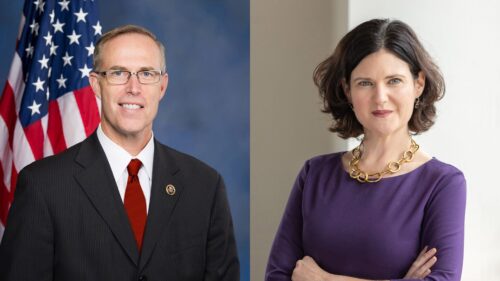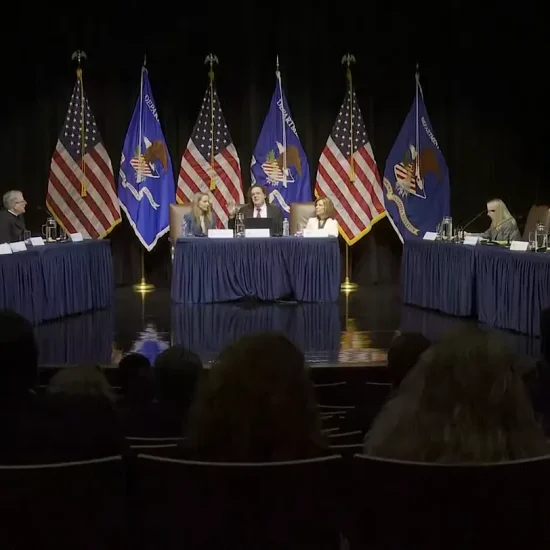
WASHINGTON (RNS) — Amanda Tyler, lead organizer of Christians Against Christian Nationalism, will attend the State of the Union address Thursday (March 7) as a guest of U.S. Rep. Jared Huffman, co-founder of the Congressional Freethought Caucus.
Tyler has become one of the loudest voices in Washington and in the country speaking against the Christian Nationalist movement, a decentralized but insistent collection of preachers, politicians, and self-appointed champions of ideas that fuse church and state, with many often insisting that the United States is ordained by God to be governed by Christian principles with Christians in charge.
The executive director of the Baptist Joint Committee, an organization that supports religious freedom, Tyler, a Texan who formerly worked for U.S. Rep. Lloyd Doggett, began opposing Christian Nationalism even before she helped to found Christians Against Christian Nationalism in 2019. Since then she has testified to Congress repeatedly to raise concerns about the dangers of the movement, which she frames as destructive both to religious liberty and to American democracy.

California Rep. Jared Huffman, left, has invited Amanda Tyler, right, to the upcoming State of the Union. (Courtesy photos)
In October she told the U.S. House Oversight Committee’s Subcommittee on National Security, the Border and Foreign Affairs, “The single greatest threat to religious liberty in the United States today, and thus our reputation as leaders in the fight for religious liberty to the rest of the world, is Christian Nationalism.”
Tyler’s presence at President Joe Biden’s speech to both houses of Congress is a signal that the Freethought Caucus, whose leadership Huffman shares with U.S. Rep. Jamie Raskin of Maryland, is seeking to expand its role as a watchdog in how religion and politics are mixed in Washington.
The caucus emerged following debates that sprung up in the wake of Huffman declaring himself a humanist — a first for a sitting member of Congress — and was announced at a Secular Coalition for America event.
“It has to be OK for someone who is nonreligious — for humanists or agnostics or atheists — to serve in the United States Congress,” Huffman said in a speech announcing the caucus.
While saying that the group’s mission would be to oppose discrimination against “agnostics, humanists, seekers, and nonreligious folks,” the California congressman also said it would be dedicated to promoting broader goals, such as “public policy formed on the basis of reason, science, and moral values” as well as protecting the “secular character of our government by adhering to the strict constitutional principle of the separation of church and state.”
In the years since, the caucus has grown to include more than 20 declared members of various religious identities, including Reps. Rashida Tlaib of Michigan, Eric Swalwell of California, Pramila Jayapal of Washington, and Jan Schakowsky of Illinois.
In November of 2020, Huffman and Raskin presented a 28-page document written by the Secular Democrats of America PAC asking then President-elect Biden to consider policy proposals designed to stymie the influence of Christian Nationalism, and encouraging fellow lawmakers to avoid phrases such as “God and country.”
The group escalated its criticism of Christian Nationalism after the Jan. 6 attack on the Capitol. Members of the caucus invited scholars and activists, including Tyler and figures from the Freedom From Religion Foundation, to brief them about the role Christian Nationalism played in the attack.
Soon after, Huffman made a speech on the House floor, crediting the experts’ briefing, saying Christian Nationalism “is infecting our government — from members of Congress and top officials in the previous administration, to the wife of a Supreme Court justice.”
Just before the report of the House select committee investigating the Jan. 6 attack was to be issued, Raskin, who sat on the committee, brought Tyler to testify before the House Oversight Subcommittee on Civil Rights and Civil Liberties, which Raskin chaired. “Christian Nationalism helped fuel the attack on the U.S. Capitol on Jan. 6, uniting disparate actors and infusing their political cause with religious fervor,” Tyler told the panel.
Some faith leaders were disappointed when the select committee’s report made only spare mention of Christian Nationalism.
While relatively quiet most of last year, the caucus has been active since Mike Johnson, a U.S. representative from Louisiana and an evangelical Christian, became speaker of the House in October. The caucus released a white paper accusing him of being “deeply connected in political practice and philosophy to Christian Nationalism.”
In February, the group joined with other Democratic lawmakers in sending a letter to Johnson voicing frustration that California megapastor Jack Hibbs had been allowed to serve as a guest chaplain to give the opening prayer in the House. Hibbs, the letter contended, is a “radical Christian Nationalist who helped fuel the January 6th insurrection and has a long record of spewing hateful vitriol toward non-Christians, immigrants, and members of the LGBTQ community.”
In a statement announcing Tyler’s appearance at the State of the Union, Huffman said, “The political climate surrounding this year’s State of the Union Address is unlike anything we’ve experienced,” citing “Christian Nationalists seeking their ‘Seven Mountains’ domination of every level of government, from local school boards to state courts like Alabama’s, all the way to the halls of Congress,” referring to a movement of far-fight Christians who aim to control the seven most influential social institutions: family, religion, education, media, entertainment, business and government.
He added: “Despite the serious threat the current Speaker of the House poses to true religious freedom, most Americans are unfamiliar with the dangerous agenda of Christian Nationalism, and don’t realize how close we are to losing church-state separation and democracy as we know it. Amanda Tyler gets it.”
Tyler in return lauded the Freethought Caucus, calling the group of lawmakers “a strong ally in our work advancing faith freedom for all.”






